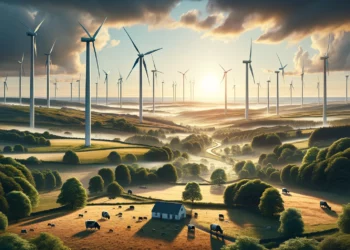Wind farms play an essential role in humanity’s mission to transition towards a 100% renewable energy future, but although their impact on the environment is minimal compared to that of fossil fuels, wind turbines are not entirely benign. According to a new study, wind turbines have cascading effects on the food chain and local ecosystems, as if they were the new apex predators in the area.

By now, it’s common knowledge that wind turbines reduce the number of local birds and bats, disrupting their migratory paths. However, the assumption that wind turbines only affect flying species fails to take into account how fewer birds, who are often predators, can change an ecosystem’s dynamic.
Maria Thaker and colleagues at the Indian Institute of Science in Bengaluru surveyed wildlife in India’s Western Ghats, where wind turbines have been functioning for the past two decades. The researchers found that the number of predatory birds, but also the number of predatory attempts (dive attacks), was four times lower in areas with wind farms than in areas without them.
The areas where wind turbines are operational have fewer predatory birds (for example, Buteo, Butastur and Elanus species), which consequently, but have a higher density of lizards, such as Sarada superba. Not only were there more lizards around wind farms, but they also had lower levels of the stress hormone corticosterone, which allowed humans to get closer to the lizards before fleeing — another important clue that the local ecosystem is experiencing less predation.
“We found that densities of the most common lizard species were three times higher in sites with wind turbines compared with those without. We also found strong trait-mediated effects of predator release: lizards at sites with wind turbine not only had lower stress-induced corticosterone levels and anti-predator behavioural responses, but they also had lower body condition and intensity of sexual ornamentation,” wrote the authors in the journal Nature Ecology & Evolution.

This study suggests that wind turbines act as an additional top level in the food chain, essentially mimicking the effect an apex predator has on the ecosystem.
Close to 17 million hectares of land is currently used for wind energy generation worldwide, with more land coverage to be added as wind energy expands. Thanks to wind energy, communities can enjoy electricity without polluting the atmosphere or contributing to global warming. However, as this study shows, wind turbines can have important disruptive effects on ecosystems, something that should be taken into account when planning their placement.






